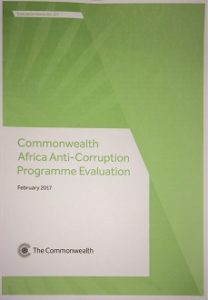 Background
Background
Last year the Commonwealth Secretariat commissioned PFMConnect Ltd to undertake an independent evaluation of its Africa Anti-Corruption Programme.
Stakeholders consulted
Views were obtained through discussions with officials from Commonwealth Africa countries, the Commonwealth Africa Anti-Corruption Centre in Botswana (http://www.thecaacc.org/) and at the Secretariat in London (http://thecommonwealth.org/). Online interviews were held with others that there was not time to visit. In addition, past participants of the Africa Anti-Corruption Centre capacity-building programmes were asked to complete an online survey giving their impressions of the training they had received, including its subsequent effectiveness back in the workplace.
Future programme development
Those interviewed produced an array of interesting ideas for the future development of the Commonwealth’s Africa Anti-Corruption Programme and attested to the value of the training offered. The evaluation report can be obtained here.
Amongst other things, the evaluation report suggests that anti-corruption agencies in Commonwealth Africa could be even more effective in their work if they formed a broader alliance with other national governance units possibly including auditors, procurement authorities, competition agencies and financial system administrators. Greater use of digital technology is advocated in support of regional collaboration and training. Proposals are also made for extending such support elsewhere within the Commonwealth with priority being given to smaller states.
The Commonwealth Secretariat is now considering the report with its various stakeholders before decisions are taken about the best way to develop the Commonwealth’s anti-corruption agenda.

 Background
Background
